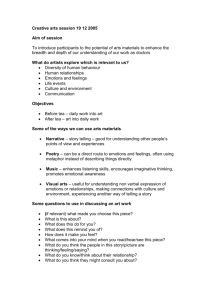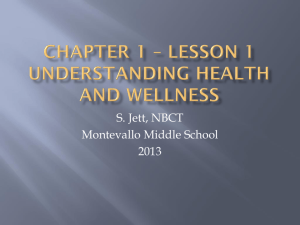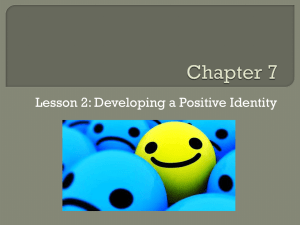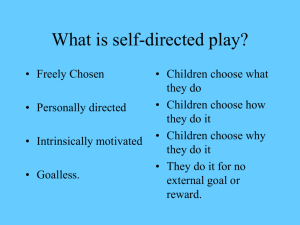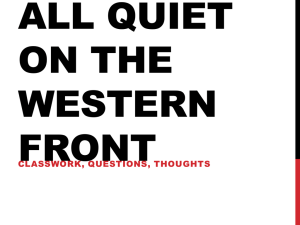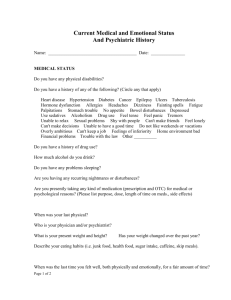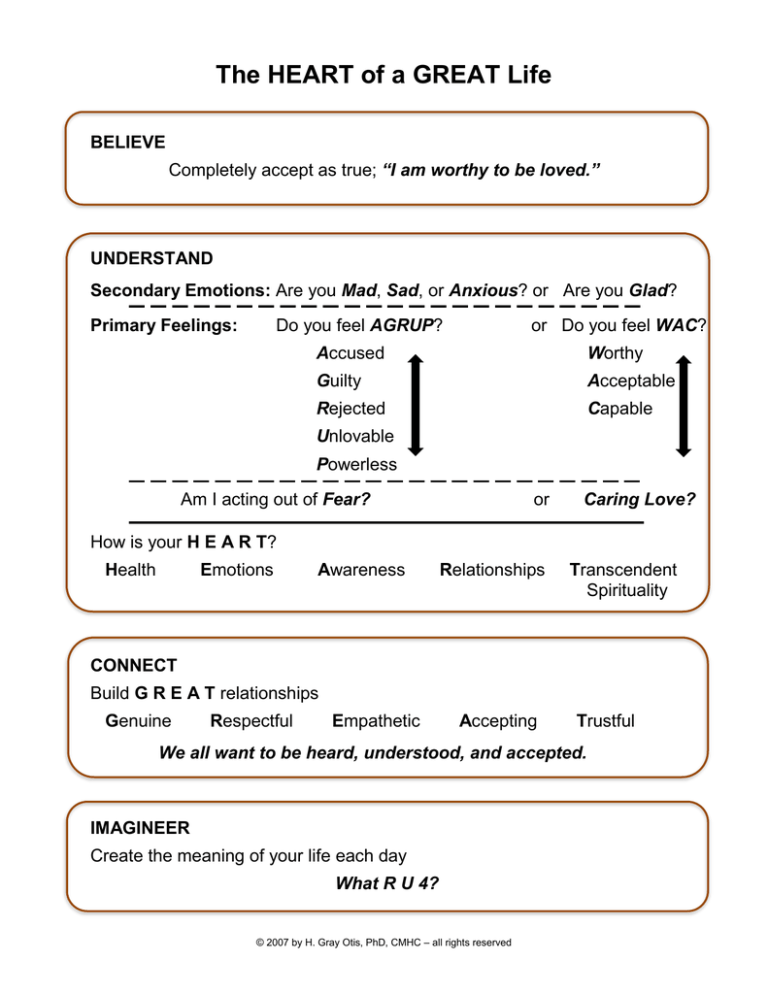
The HEART of a GREAT Life
BELIEVE
Completely accept as true; “I am worthy to be loved.”
UNDERSTAND
Secondary Emotions: Are you Mad, Sad, or Anxious? or Are you Glad?
Primary Feelings:
Do you feel AGRUP?
or Do you feel WAC?
Accused
Worthy
Guilty
Acceptable
Rejected
Capable
Unlovable
Powerless
Am I acting out of Fear?
or
Caring Love?
How is your H E A R T?
Health
Emotions
Awareness
Relationships
Transcendent
Spirituality
CONNECT
Build G R E A T relationships
Genuine
Respectful
Empathetic
Accepting
Trustful
We all want to be heard, understood, and accepted.
IMAGINEER
Create the meaning of your life each day
What R U 4?
© 2007 by H. Gray Otis, PhD, CMHC – all rights reserved
Four Paradigms of Recovery
A Criterion Counseling Model for Successfully Overcoming Addiction
H. Gray Otis, PhD, CMHC, DCMHS-T
grayotis@thephoenixrc.com
Clinical Director, The Phoenix Recovery Center
801-885-8585
The Four Paradigms of Recovery can serve as a model to integrate the client’s positive experiences which they had
before their addiction with current constructive recovery experiences. This model correlates with Twelve Step principles.
BELIEVE: “I am worthy to be loved.” Virtually everyone in initial recovery does not accept that they are love worthy. In
many cases, this is the fundamental underlying reason for their dependence.
Substance or Behavioral Dependence
Shame Self-Beliefs
Shame self-beliefs distort and disfigure how individuals perceive themselves.
Evidence is accumulated that the shame beliefs are true
The psychic pain of shame dominates consciously and subconsciously – e.g. destructively disparaging self-talk
This is the petri dish in which bacteria of addiction thrive
Therapeutic considerations:
Seek out shame beliefs: “What are you ashamed of?” “What traumatic or chronic distress experiences have you had?”
“What negative beliefs do you have about yourself starting with the words; ‘I am. . .’? (e.g. I am “stupid,” “I am unsafe”
Distinguish for the client the difference between guilt and shame (e.g. “I did something that was bad” or “That was an
idiotic thing for me to do” [guilt] vice “I am bad” or “I am an idiot” [shame]
Help clients transform shame self-beliefs into positive self-beliefs – Brene Brown (Vulnerability, etc.), EMDR,
affirmations, Thought Field Therapy (Instant Emotional Healing, Lambrou & Pratt), Sand Tray, Cognitive Processing
Therapy, Trauma Focused CBT, Stress Inoculation Therapy, etc.
UNDERSTAND: Emotions, feelings, and self-regulation. Virtually all people afflicted with dependence have used
substances and behaviors to numb out their painful emotions.
Withdrawal usually brings an immense increased of often overwhelming emotions and feelings.
Most do not have a vocabulary to describe what they are experiencing
They feel flooded with unwanted emotional pain
Therapeutic considerations:
Teach an easy-to-understand emotional vocabulary
Distinguish between secondary emotions (e.g. “I am mad”) from primary feelings (e.g. I feel Accused, Guilty,
Rejected, Unlovable, and/or Powerless) so that the client can identify and discuss their emotions and feelings
Focus on their emotional experience (e.g. What emotions are you experiencing now. What feelings?
Help them learn principles of emotional intelligence particularly how to regulate their emotions.
Clients rarely know how to perceive the balance needed for recovery? They seldom recognize how the 12 Steps integrate
the key elements of successful living. Help them daily review their well-being.
Therapeutic considerations: How goes your H E A R T?
How is your Health? – Sleep 7 to 8 hours, eat well, drink enough water, exercise regularly, take care of health needs,
nurture your well-being, stop smoking, take a supplement if needed, limit caffeine, sodas, & sugar
How are your Emotions? Recognize emotions & feelings, regulate & soothe yourself, appreciate positive feelings,
practice gratitude, understand yourself, use empathy to understand others
How is your Awareness? Know what you are focusing on, use your mind to resolve shame and to work through guilt,
value your worth & the worth of others, realize that you are becoming more Worthy, Acceptable, and Capable
How are your Relationships? Clean up your side of the street (& only your side), work through resentments, practice
forgiveness, support the “Five Positives to One Negative Interactions,” sit as an adult not as a parent or child
How is your Transcendent spirituality? Develop your own sense of the spiritual, tap into the energy of your higher
power, become open to ‘Coincidences,’ find the joy in enjoyment and the heart of courage in encouragement
© 2007 by H. Gray Otis, PhD, CMHC – all rights reserved
CONNECT: In substance or behavioral addictions the common thread is isolation. Shame causes us to withdraw into a
cocoon of seclusion & dependence.
In recovery the ability to connect with others & higher power leads each person to connect with self.
Help others to resolve their part of family conflict & disengagement.
Work with them to visualize new relationship strategies
Help them understand family constellations
Therapeutic considerations
Build G R E A T relationships
Am I Genuine?
Do I demonstrate that I am genuine by being honest, sincere, open, truth full, & transparent so
that others can be at ease with me?
Am I Respectful
Do I respect the ability of every adult to make their own choices even when I disagree? Do I
allow them to be responsible for the results of their decisions?
Am I Empathetic
Do I express through empathy that I care enough to listen, understand, and want the best for the
other person? Do I understand what others are saying, their feelings, their fears & their love?
Am I Accepting``
Do I fully accept the other person as they are. Even when I disagree with them, can I express my
thoughts without ‘constructive criticism’ or imposing my values and expectations on them?
Am I Trustful
Do I believe in the basic good-hearted nature of the other person by acknowledging the best
about them? Am I trustful of their intentions?
We all want to be heard, understood, and accepted
IMAGINEER: Create the meaning of your life each day
In addiction, creativity is focused on obtaining, using, & hiding the use of substances
There is little or no effort concentrating on obtaining enjoyment, meaning, or fulfillment
Those caught up in dependence may fear the responsibility & opportunity to create their own life
In recovery, sobriety is never enough – it is fundamental but each person has to envision their life as satisfying &
worthwhile
Therapeutic considerations
Engage the client in identifying their values
Help them develop understand what their aspirations are by focusing on the desires they want in their life - not merely
what do not want (e.g. create a wheel of good fortune)
Teach them how to
o imagine using the power of visualization what they want – and then –
o engineer the creation of their desires on a daily basis
When Walt Disney’s team created Disneyland, he called this capability, “Imagineering”
What R U 4?
Conclusions
1. The Four Paradigms of Recovery can be integrated into Twelve Steps programs
2. This approach address the underlying sources of dependence addictions and behaviors
3. In initial recovery, the Four Paradigms provide the counselor and the client with a model they can use to build their
life’s path and their own comprehensive program of recovery
4. The Four Paradigms are based on a holistic health principles utilizing individual skill development
5. Positive reinforcement is a natural effect of using these skills
6. Those in recovery can learn how to put into practice these skills and achieve better outcomes
7. As counselors, it is imperative that we also attend to taking care of ourselves by practicing these skills with our clients,
those whom we work with, as well as our family and friends
The achievement of health is never merely the absence of disease symptoms
© 2007 by H. Gray Otis, PhD, CMHC – all rights reserved

